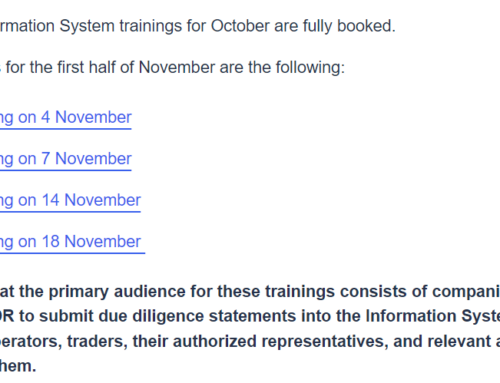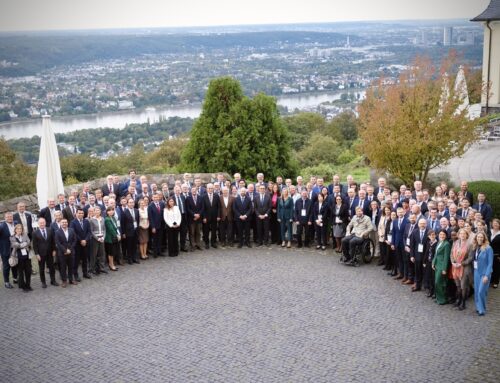
The Green Deal and the timber industry: Interview with Andreas Kleinschmit von Lengefeld, Director at FCBA
Is the sector in working together in order to capture the opportunities of the "Green deal"?
Interview with Andreas Kleinschmit von Lengefeld, Director of International Operations at FCBA (Institut Technologique Forêt Cellulose Bois-construction Ameublement- the French Institute of Technology for Forest-based and Furniture Sectors).
- Fordaq : At the end of last year, the European Commission presented its Green Deal. Basically, it is about massively helping to finance the ecological transition. Is this an opportunity for the European wood industry?
- Andreas Kleinschmit : Of course! Our entry points are, in order, the development of an industry and a circular economy, of building energy efficiency and resource management, protecting biodiversity and of course the development of renewable energies. In particular, the Green Pact will go hand in hand with several initiatives and strategies such as the circular (bio) -economy, or the definition of a new strategy for European forests, which should build on the 2030 biodiversity strategy.
- Fordaq : Doesn't that raise the risk of forest sanctuarization?
- Andreas Kleinschmit : This fear is real and finds its expression in the positions of organizations like EOS-OES,CEI Bois or Le Club du Bois (both in partnership with EPF), in Brussels, who insist on the importance of maintaining accessibility to the forest resource. They play their role as pressure groups defending the interests of the processing industry, in a context of which we are little aware in France and in the various countries of the Union. In Brussels, faced with representatives who are a little scattered and little equipped with the timber industry, it is often international NGOs that set the tone when it comes to forests.
- Fordaq : What should be done?
- Andreas Kleinschmit : The Green Pact is a “historic” opportunity for the European forest, and it is true that it intervenes at five minutes to midnight, at a time when the very existence of the European forest is called into question by multiple phenomena, such as for example storms, bark beetle attacks, invasive species. Potentially, we can finally capture the essential means to save the forest, adapt it and develop a virtuous transformation sector. No doubt we have never had such an opportunity.
- Fordaq : All the same, the organizations of the German and Austrian timber industries have just published the joint declaration concerning the Green Pact / Green deal.
- Andreas Kleinschmit : It's a good start. The declaration sticks to the main principles and there was probably nothing to prevent it from being co-signed by all the other umbrella organizations in Europe's national wood supply chains, except for the difficulty of these various supply chains to act in concert. That said, there is nothing to prevent other European countries from associating themselves with this German declaration in the days that follow, to give it more weight.
- Fordaq : Statements are one thing. Capturing the financial means to save the European forest from climate change is another.
- Andreas Kleinschmit : This is largely a question of Brussels engineering. The national sectors are far too focused on the national market of a few countries, on their differences within the sector and sometimes, nevertheless, competition with competing sectors. They are sometimes not even aware of the extent to which what is at stake in Brussels requires strong operational expertise. For the time being, two main options are emerging. The first would be the gathering in Brussels of all the European representations of professional organizations related to the wood sector: CEI Bois (wood industry), EOS (sawmills), EPF (panels), FEBO (wood trade), Eustafor (forests) public), CEPF (private foresters). For the past fifteen years, CEI Bois, EOS and EPF have come together to create Le Club du Bois, in direct contact with MEPs. The second track is that each European country commits to the national level by appointing their European referents for its entire wood sector.
- Fordaq : What is most likely to work?
- Andreas Kleinschmit : A priori, it would be the meeting of all the European federations relating to the wood sector and the creation of a representation relating to the entire value chain. However, insofar as these federations emanate from national professional federations which do not defend the wood sector as a whole, but rather their interests well understood, the bringing together at European level of the representatives of the forest and those of the industry has not been done throughout these years despite the initiative of the Club du Bois. Conversely, the joint initiative of Germany and Austria shows that progress is being made in terms of the unification of national timber industries. If we take the example of France, a lot of work has been done in recent years in terms of governance. France could be part, with Austria and Germany, the drivers of a complementary approach which would aim to set up a Green Pact task force by country and rather by national timber industry. Because what is of strategic importance is that there is a direct link between Brussels and the national sectors. We have clearly seen that this approach worked very well during the Brexit negotiations. In any case, I do not see a third way, while Europe's wood industries are facing an absolute emergency today, both because of the patent consequences of accelerating climate change, and of the means potentially put on the table on a European scale. Organized as it is today, the European wood industry is likely to miss this opportunity, the drivers of a complementary approach which would aim to set up a Green Pact task force by country and rather by national timber industry. Because what is of strategic importance is that there is a direct link between Brussels and the national sectors. We have clearly seen that this approach worked very well during the Brexit negotiations. In any case, I do not see a third way, while the wood sectors of Europe today face an absolute emergency, both because of the obvious consequences of climate change, which is accelerating, and means potentially put on the table on a European scale.
- Fordaq: Admitting that such a task force is in place, how it should proceed?
- Andreas Kleinschmit: Logistically, the means of interconnection are available. The main question is rather how to prioritize our approach, and to avoid dead ends. Clearly, it seems to me that what it is appropriate to do as is currently being done in Scandinavia or in Central Europe, namely to put the accent on construction. Admittedly, in several European countries, the share of wood construction is a little higher and it is progressing under favorable conditions. Today, construction is digging our grave in terms of climate, while it represents the best way to store carbon in the long term, via bio-based building materials. As it stands, the most luxuriant European forest barely manages to offset the massive emissions from the construction world. And yet, with wood and biobased materials, construction would make it possible to build from the forest this second forest which prolongs the storage of CO2 while allowing the regenerated replanted forest to fully play its role of carbon vacuum cleaner, via the photosynthesis. It is not a question of neglecting the other aspects of the wood sector, but of concentrating our forces on the sector where our chances of progress are the strongest. A sector which is interconnected with almost all sectors of activity in the wood sector. Today, the building sector is both the red lantern of the ecological transition, and the obvious spearhead of the economic development of the wood sector in Europe. Tomorrow, by making better use of our hardwoods in construction and landscaping, it could be otherwise.
Source:https://www.fordaq.com/news/GreenDeal_timber_industry_wood_construction_66902.html
Related Posts
Contact
EUROPEAN ORGANISATION
OF THE SAWMILL INDUSTRY AISBL
Rue Montoyer 24/box 20
BE-1000 Brussels
Tel.: +32 2 287 08 68
Email: info@eos-oes.eu



